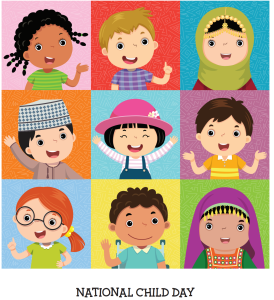Aaniin, Shé:kon, Tawnshi, Miyotôtâkewin, ᐃᓄᒃᑎᑐᑦ, Biindigen and Welcome!
National Child Day 2025 – Celebrating Children’s Rights
National Child Day is celebrated in Canada on November 20th each year. Celebrating National Child Day is about celebrating children as active participants in their own lives and in communities, as active citizens who can and should meaningfully contribute to decision-making.
Right: the things that allow children to live to their fullest potential
Need: the things that are absolutely necessary for all children to have or be able to do to live a happy and healthy life
Want: the things that are nice to have but are not necessary for a full life
Celebrate National Child Day with the children and youth in your life by using the activities and ideas in this guide. The learning activities are designed to be fun, practical and easy to use by teachers, parents, youth group leaders and camp facilitators, among others. This activity guide is not a comprehensive rights document. However, throughout the guide are ideas for children to learn about and celebrate their rights. Children are also encouraged to reach out to their local, national and global communities to engage on children’s rights. Finally, young Canadians can facilitate their own learning and outreach using the “You have the right to know your rights” and “Generation GO” sections of the guide. Specific curriculum units from Kindergarten to Grade 12 in all of Canada’s provinces and territories recognize the importance of child rights education. This guide fulfills the curriculum expectations described below.
For more information visit: National Child Day – Canada.ca
Regional Network Information
Regional Networks are comprised of supervisors, coordinators and educators of First Nation Early Learning Programs located in each of the 4 regions of the province. The establishment and sustainability of these networks was identified as a priority by First Nations. The networks support the delivery of high quality, culturally appropriate programs and services. The benefits of regional networks include information sharing, knowledge exchange, skills development, collaborative problem solving and solution-finding for common issues.
The 4 regional network pages include directories for licensed child care and child and family programs.

